
Time USA – 19 January 2015
.pdf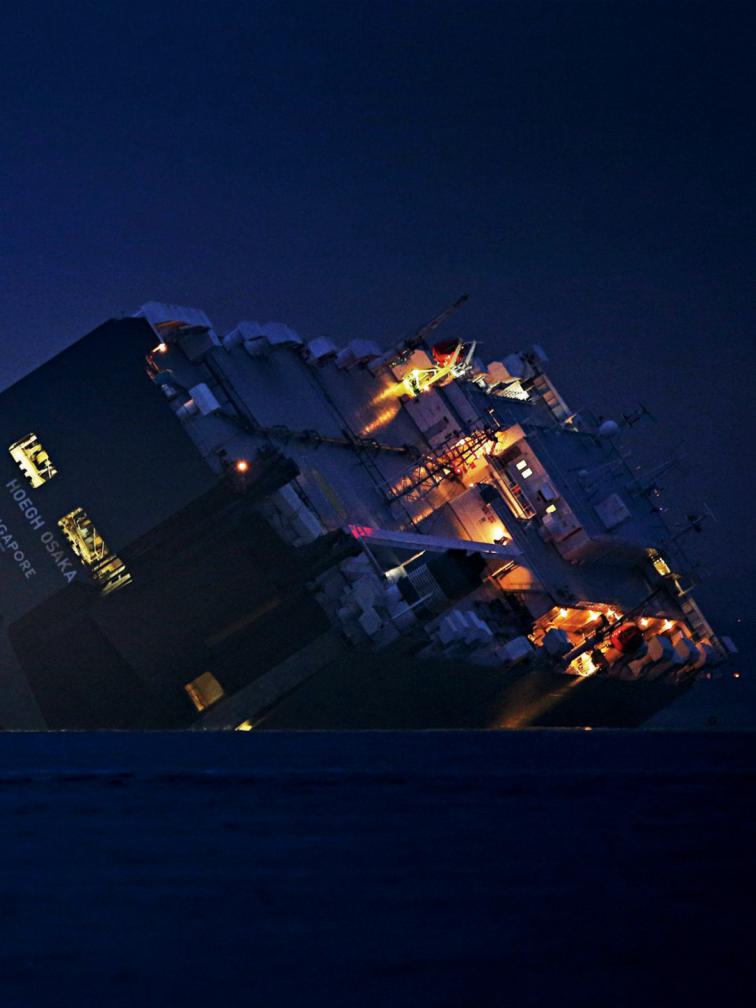
WorldMags.net
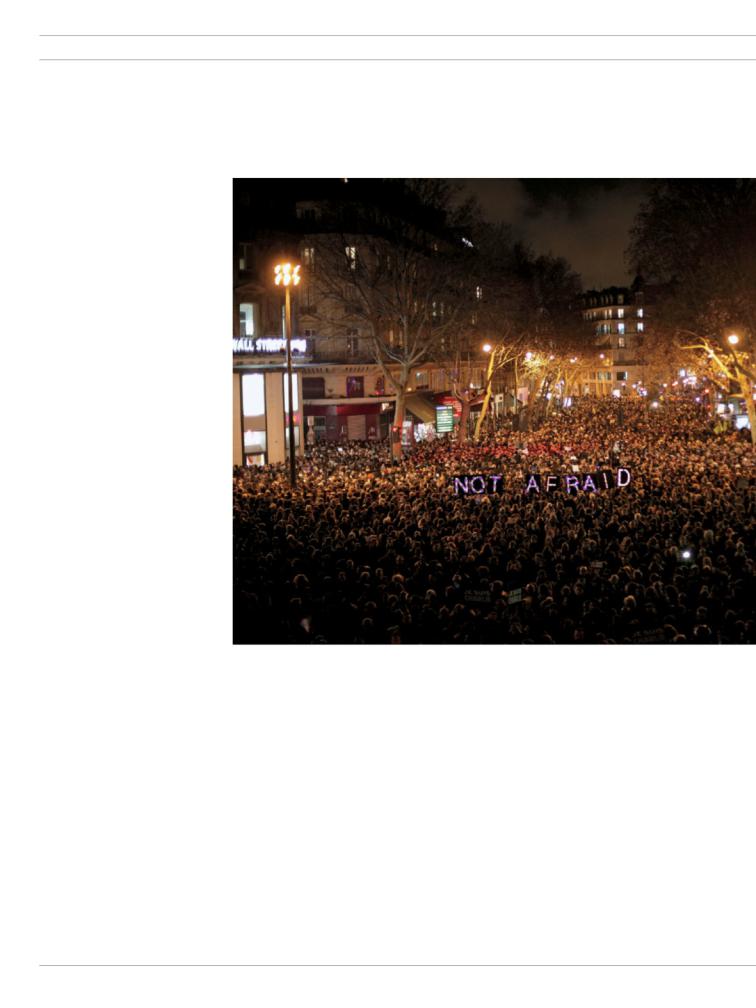
Briefing
World
An Attack Foretold French
RèFLDOVZHUH concerned even
EHIRUHWZR JXQPHQVWRUPHG D3DULVQHZVSDSHU
BY VIVIENNE WALT/PARIS
the french, who have seen two devastating world wars and a revolution on their soil, are known for keeping cool heads in the face of tragedy and violence. Yet little could have prepared them for the gruesome events of Jan. 7. It seemed a gray, rainy Wednesday like any other, until
two gunmen wearing black ski masks stormed into the offices of the satirical weekly newspaper Charlie Hebdo just before midday, in Paris’ congested 11th district, and let loose a fusillade of bullets.
Outside on the street they shot dead a police officer and fled in a black car driven by a third man—a horrifying sequence of events filmed by a witness and seen around the world.
The men killed 12 people in the attack, among them three of France’s best-known cartoonists, the paper’s top editor and two police officers. Rushing to the scene, President François Hollande stood ashen-faced on the chilly sidewalk, some 3 miles (about 5 km) from his grand Elysée Palace, and appealed for the French to “show we are a united country.” “This was an act of exceptional barbarity,” he said, and declared the attack “a terrorist operation.”
The massacre—France’s worst terrorist attack in memory—was something
Defiant Thousands of Parisians gathered in the Place de la République on the evening of the attack
else too: it was an act foretold. For months, French officials have expressed concerns that the country was becoming increasingly vulnerable to a terrorist attack. Last month
their nervousness appeared well justified, when two separate drivers rammed their cars into Christmas crowds in the provincial cities of Nantes and Dijon, injuring dozens of people, while a third attacker wielded a knife, shouting, “Allahu akbar,” or “God is great.”
Those car rammings now seem amateurish and
opportunistic—more the work of lone-wolf terrorists acting without support. In contrast,
the men who mounted the Jan. 7 massacre worked like a well-drilled cell primed to inflict maximum damage.
Their target was clear: Hardline Islamists have threatened
Charlie Hebdo for years for publishing countless caustic
)5(1&+ 32/,&( %(/,(9( $%287&,7,=(16 +$9( -2,1(' ,6/$0,67 *52836 ,1 6<5,$ $1' ,5$4 6,1&(
commentaries and cartoons directed at extremist Muslims (as well as ultra-religious Jews and conservative Catholics). In 2011 Muslims firebombed Charlie Hebdo’s previous office building in Paris amid widespread protests after the paper published an issue purportedly edited by the Prophet Muhammad, with a cartoon lampooning him. French people quickly assumed that the assault had been an act of retaliation against the paper’s antireligious stance.
The attack’s ruthless efficiency shocked Parisians as much as the result. Arriving at the very moment Charlie
P A — S U M A C LT U A B I H T
16 |
WorldMags.net |
time January 19, 2015 |
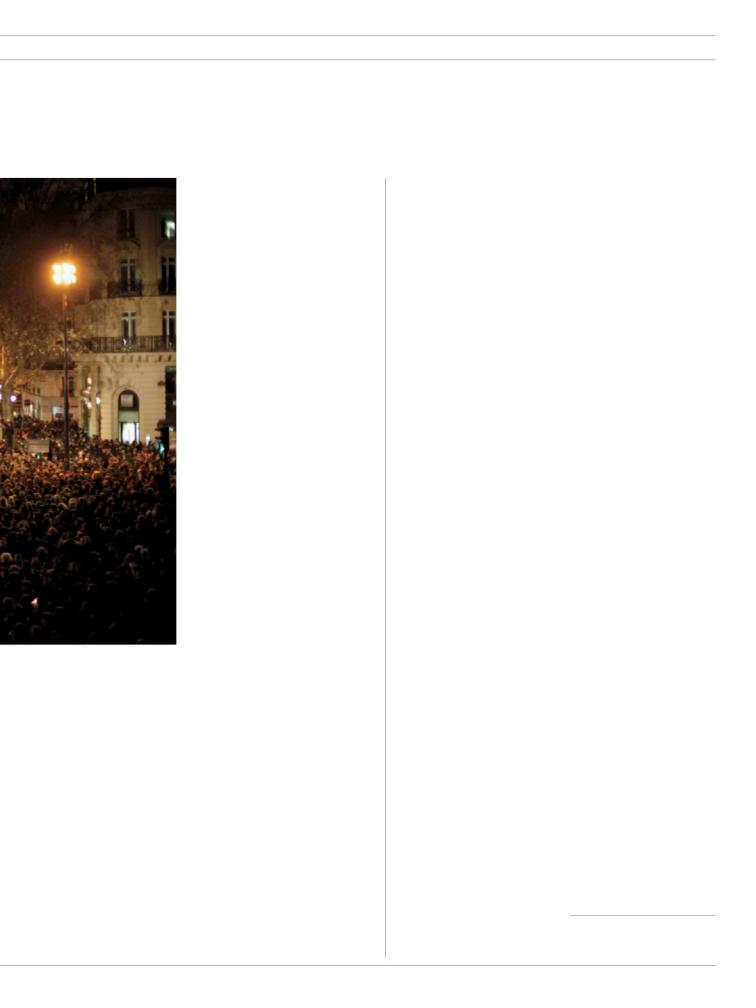
Briefing
Hebdo’s journalists were in their weekly editorial meet- ing—the only time the entire staff gathers in the build- ing—the two assailants sprang from their vehicle carrying automatic rifles and wasted no time killing as many people as they could. “They were well equipped, they had military weapons, they had probably bulletproof vests,” French terrorism consultant Jean-Charles Brisard told the BBC after watching video footage from a closed-circuit security camera outside the building. “These individuals were well trained.”
The attackers are precisely the sort of terrorists the French
government has most feared. With more than 5 million Muslims, France has the largest Islamic population in all of Europe. Many French Muslims emigrated from French-speaking North Africa or were raised as children of immigrants from those countries. Their communities have been hard hit by years of recession as France struggles with record-high unemployment now nearing 11%.
Some young French Muslims, disillusioned by the economic hardship and what they see as a French population increasingly hostile to outsiders, have looked abroad for direction and meaning, to the jihadist groups fighting in Syria and Iraq. French police believe about 1,200 French citizens have joined Islamist groups in Syria and Iraq since 2011—by far the most fighters to have joined the jihadists from any Western country. French officials now fear that those filtering home might return with professional military skills and a desire—or even instructions—to harm France.
In response to the attack, Hollande quickly ordered France’s security threat raised to its highest level in years, while Interior Minister Bernard Cazeneuve vowed to hunt down the attackers “so they can be punished with the severity that their barbarous acts are worthy of.”
Those words sound reassuring—for now. And as darkness fell on Jan. 7 Parisians came together in
mass gatherings to show their sympathy for the dead and to insist on their right to express themselves free of the threat of violence. But citizens and security officials alike know that unity will not necessarily deter future attacks.
Figures Who Were Literally Irreplaceable ǎHUHVQRRQHLQ )UDQFHZKRFDQoOOWKHLUUROH
BY CLAIRE BERLINSKI
I’m a journalist but was only by chance in the vicinity of the massacre at the French satirical newspaper Charlie Hebdo. I was en route to visit a friend. This took me past the paper’s office and thus put me at the heart of the bloodiest attack France has seen in the past 50 years.
On my approach, it was immediately obvious that there had been a massive terrorist attack. Such attacks have
a characteristic signature. Swarms of ambulances. Police vehicles and mobile labs. Grimfaced cops. Crime-scene tape stretching for blocks. A very particular expression on the faces of dazed and bewildered onlookers.
I asked the first cop I saw what had happened. She was in no mood to explain: “You’ll see it on the news.”
“How bad is it?”
“Grave.” Not quite translatable, but “as bad as it gets” will do.
France is in shock. The attack killed 12 people and injured several others
critically, as of press time. The number of fatalities may rise. Masked gunmen attacked the paper’s office. But their object was not merely to terrorize. This is obvious, and let no one tell you otherwise. This was an attack on France. It was an outright declaration of war.
It was an attack on press freedom in particular—
on journalists, writers, cartoonists and intellectuals who were as well known here as Jon Stewart and Stephen Colbert are to Americans. They were known above all for their willingness to say whatever they damn well pleased—no matter whom they offended
or how many death threats resulted. While their publication was best known for its parodies of Muslim
extremists, they were more than happy to say whatever they pleased about Jews and Catholics too—and never were that respectful, either. But only radical Islamists thought the proper rejoinder was simply to kill them all.
In December 2011, the magazine’s office was
firebombed following an issue it claimed was “guest edited” by the Prophet Muhammad.
Shortly before the latest attack, it tweeted a mildly amusing cartoon of the leader of the Islamic State of Iraq and Greater Syria.
The cartoonists who died—Charb, Cabu, Tignous, Wolinski—were household names. Bernard Maris, known as Uncle Bernie, was an economist to whom the French have listened every Friday morning on the radio since the 1990s.
Le Monde, Radio France and France Télévisions have lent their staff to keep Charlie Hebdo going, but France is not a big enough country
to replace such figures readily. They were literally irreplaceable. This is true of every human being, of course, but they in particular filled
a role no one else in France can fill.
In 2012, in an interview with Le Monde, Stéphane Charbonnier, Charlie Hebdo’s director, was asked if he was tempted to tone down the publication’s inclination toward the inflammatory.
“It may sound pompous,” he replied, “but I’d rather die standing than live on my knees.”
It hardly sounds pompous at all. Especially given that this is precisely what he did.
Berlinski, an American journalist and biographer, lives in Paris
WorldMags.net |
17 |
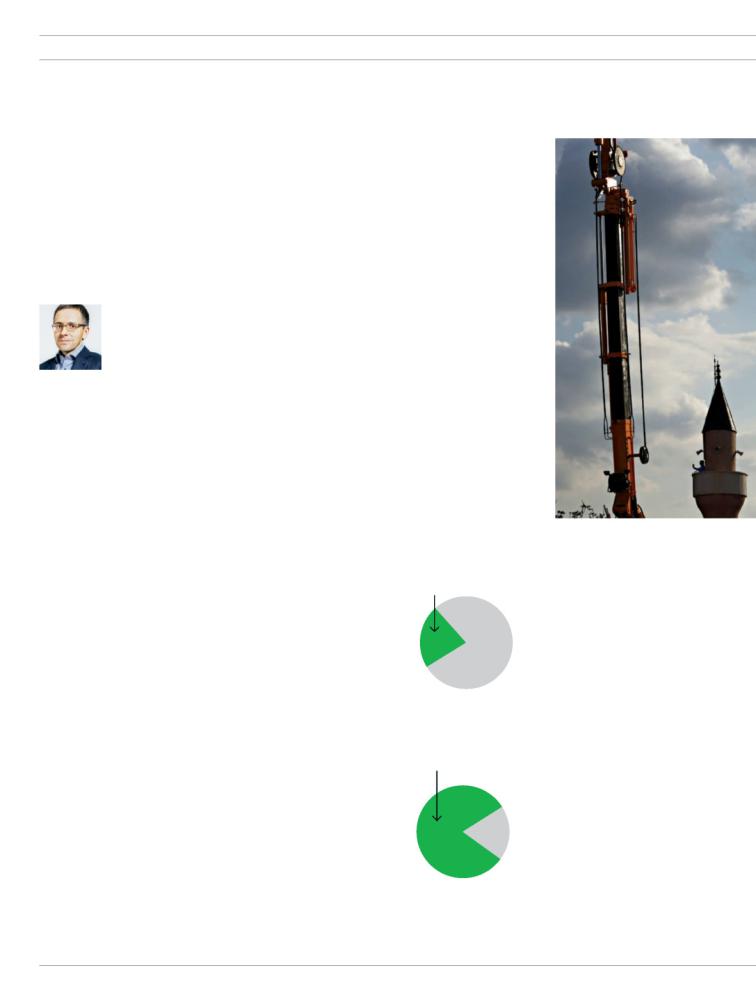
Briefing | World
Sea of Troubles ǎH 1HZ <HDU KROGV
XQFRPPRQ ULVNV +HUH DUH RI WKH
PRVW ZRUULVRPH RQHV
By Ian Bremmer
every january, eurasia group, the political-risk consultancy
I founded and oversee, publishes a roundup of the most crucial geopolitical trends of the coming year. The ranking reflects our forecast of which global story lines will rise to the forefront over the next 12 months, which will have the biggest impact on the markets and on
politics—and where we can expect surprises.
As 2015 dawns, political conflict among the world’s great powers is at a higher pitch than at any time since the end of the Cold War. U.S. relations with Russia are now fully broken. China’s powerful President Xi Jinping is creating a new economy, and the effects will be felt across East Asia and around the rest of the world. Geopolitical uncertainty has Turkey, the Gulf Arab states, Brazil and India hedging their bets. International finance will be weaponized—and that could backfire on the U.S.
But the year’s top risk is found in once placid Europe, where an increasingly fractious political environment is generating new sources of conflict.
1. THE BROKEN POLITICS OF EUROPE
European economics aren’t as bad as they were at the height of the euro-zone crisis in 2012, but the politics of Europe are now far worse. Within key countries like Britain and Germany, anti-E.U. political parties continue to gain popularity, undermining the ability of governments to deliver on painful but needed reforms. Friction will grow among European states as peripheral governments come to increasingly resent the influence of a strong Germany unchecked by a weak France or an absent Britain. Finally, an angry Russia and the aggressive Islamic State of Iraq and Greater Syria (ISIS) will add to Europe’s security worries.
2. RUSSIA
Sanctions and lower oil prices have weakened Russia enough to infuriate President
Vladimir Putin—but not enough to restrain him. Moscow will continue to put pressure on Ukraine, and as a result, U.S. and European sanctions will tighten. As Russia’s economy sags, Putin’s approval ratings at home will increasingly depend on his willingness to confront the West. Western companies and investors are likely targets—on the ground and in cyberspace.
3. THE EFFECTS OF CHINA’S SLOWDOWN
China’s economic growth will slow in 2015, but it’s all part of Xi’s plan. His historically ambitious economicreform efforts depend on transitioning his country to a consumer-driven economic model that will result in levels of growth that are lower but ultimately more sustainable. The continuing slowdown should have little impact inside China. But
U.S. percentage of global GDP
22%
Percentage of global trade finance conducted in U.S. dollars
81%
Graphic sources: Eurasia Group; Swift via Bloomberg
countries like Brazil, Australia, Indonesia and Thailand, whose economies have come to depend on booming trade with a commodity-hungry China, will feel the pain.
4. THE WEAPONIZATION OF FINANCE
For the moment, the U.S. public has had enough of wars and occupations, but the Obama Administration still wants to exert significant influence around the globe. That’s why Washington is turning finance into a weapon. It is using carrots (access to capital markets) and sticks (various types of sanctions) as tools of coercive diplomacy. The advantages are considerable, but there is a risk that this strategy will damage U.S. companies caught in the cross fire between Washington and targeted states. Transatlantic relations could suffer for the same reason.
18 |
WorldMags.net |
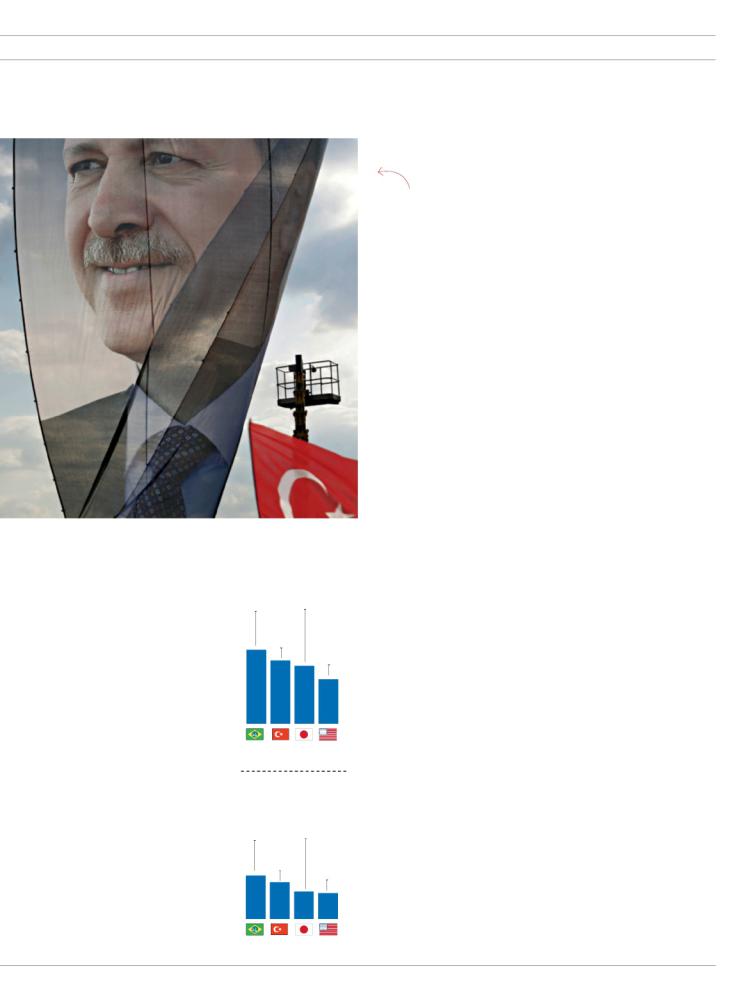
Briefing | World
E D O U — G E T T Y I M A G E S R E P O R TA G E
5. ISIS, BEYOND IRAQ AND SYRIA
ISIS faces military setbacks in Iraq and Syria, but its ideological reach will spread throughout the Middle East and North Africa. It will grow organically by setting up new units in Yemen, Jordan and Saudi Arabia, and it will inspire other jihadist organizations to join its ranks— Ansar Beit al-Maqdis in Egypt and Islamists in Libya have already pledged allegiance to ISIS. As the militant group’s influence grows, the risk to Sunni states like Saudi Arabia, the United Arab Emirates and Egypt will rise.
6. WEAK INCUMBENTS
Feeble political leaders, many of whom barely won re-election last year, will become a major theme in 2015. Brazil’s Dilma Rousseff, Colombia’s Juan Manuel Santos, South Africa’s Jacob
time January 19, 2015
Fallen star Turkey’s Erdogan is one of a number of incumbent leaders who will face strong rivals at home in 2015
Zuma, Nigeria’s Goodluck Jonathan and Turkey’s Recep Tayyip Erdogan will each face determined opposition and formidable obstacles as they struggle to enact their political agendas.
7. THE RISE OF STRATEGIC SECTORS
Global businesses in 2015
|
|
|
will increasingly depend |
|
|
|
|
on risk-averse governments |
|
|
|
|
that are more focused on |
|
|
|
|
political stability than eco- |
|
|
|
|
nomic growth, supporting |
|
|
|
|
companies that operate in |
|
|
|
|
harmony with their political |
|
|
|
|
goals—and punishing those |
|
Past approval rating |
that don’t. We’ll see this |
|||
trend in emerging markets, |
||||
Dilma |
Shinzo |
|
where the state already plays |
|
Rousseff, |
|
a more significant role in |
||
Abe, |
|
|||
post-2010 |
|
|||
2013 |
|
the economy, as well as in |
||
peak |
|
|||
Recep |
|
|
rogue states searching for |
|
Tayyip |
|
Barack |
||
|
weapons to fight more power- |
|||
Erdogan, |
||||
2011 |
|
Obama, |
ful governments. But we’ll |
|
post-2012 |
||||
79% |
||||
|
peak |
also see it in the U.S., where |
||
71% |
67% |
|
national-security priorities |
|
|
57% |
|||
|
|
have inflated the military- |
||
|
|
|
industrial complex, which |
|
|
|
|
now encompasses technol- |
|
|
|
|
ogy, telecommunications and |
|
Brazil Turkey |
Japan |
U.S. |
financial companies. |
|
|
||||
|
|
8. SAUDI ARABIA |
|
Current approval rating |
VS. IRAN |
||
The rivalry between Shi‘ite |
|||
|
|
||
Rousseff, |
Abe, |
Iran and Sunni Saudi Arabia |
|
is the engine of conflict in |
|||
2014 |
2014 |
||
Erdogan, |
the Middle East. Washington |
||
and other outside powers |
|||
2014 |
Obama, |
||
are increasingly reluctant to |
|||
56% |
2014 |
||
|
intervene in the region, while |
||
51% |
44% 43% |
both countries struggle with |
|
|
|||
|
|
complex domestic politics |
|
|
|
and rising anxiety about |
|
Brazil Turkey |
Japan U.S. |
the ongoing negotiations |
|
|
|
over Iran’s nuclear program. |
|
|
WorldMags.net |
||
Expect Tehran and Riyadh to use proxies to fuel trouble in more Middle Eastern countries than ever in 2015.
9.TAIWAN/CHINA
Relations between China and Taiwan will deteriorate sharply in 2015 following the opposition Democratic Progressive Party’s landslide victory over the ruling Nationalist Party in Taiwanese local elections this past November. If China decides that its strategy of economic engagement with Taiwan has failed, it might well backtrack on existing trade and investment deals and significantly harden its rhetoric. The move would surely provoke public hostility in Taiwan and inject even more anti-mainland sentiment into the island’s politics. Any U.S. comment on relations between China and Taiwan would quickly increase tensions between Beijing and Washington.
10.TURKEY
Lower oil prices helped, but President Erdogan used election victories in 2014 to try to sideline his political
enemies—of whom there are many—while remaking the country’s political system to tighten his personal hold on power. But he’s unlikely to win the authority he wants this year, creating more disputes with his Prime Minister, weakening policy coherence and worsening political unpredictability. Given the instability near Turkey’s borders, where the war against ISIS rages, that’s bad news for everyone. Refugees from Syria and Iraq are bringing more radicalism into the country and adding to economic hardship.
19
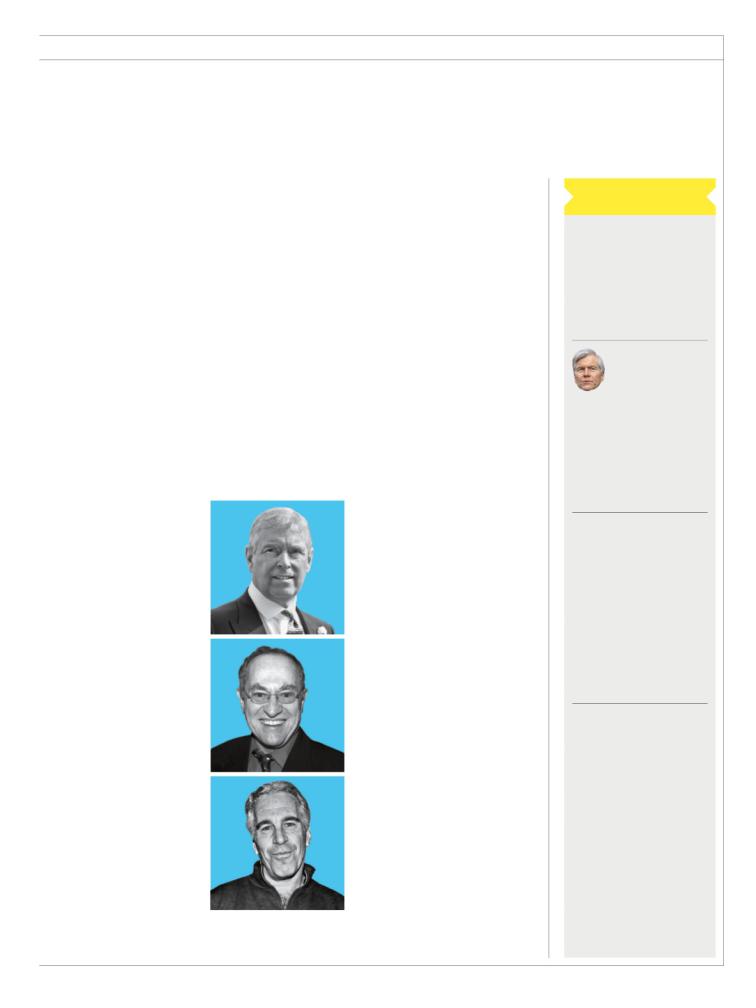
Nation
Settling Old
Scores
A new lawsuit could revive a
KLJKSURoOHVH[ case
BY MICHAEL SCHERER
the 13-page legal filing landed at a Florida courthouse on Dec. 30 with a bang. As part of a lawsuit accusing the Justice Department of botching a major sex-crime prosecution, attorneys Bradley Edwards and Paul Cassell, a former federal judge, laid out the shocking claims of their latest client, Jane Doe #3, who has been named elsewhere as Virginia Roberts. She said she had been kept as a teenage “sex slave” by the wealthy American financier Jeffrey Epstein. Cassell’s suit has the potential to both reopen the long-closed case and force the Justice Department to change the way it deals with crime victims during plea negotiations.
In the recent filing, Roberts said Epstein arranged for her to have sex with his friend Prince Andrew, the Queen of England’s second son, and trafficked her to “numerous prominent American politicians,” “a well-known Prime Minister” and others, including noted Harvard professor Alan Dershowitz, one of Epstein’s attorneys. Buckingham Palace strongly denied the allegations, which had first been hinted at in a civil lawsuit in 2009 and later in press reports that included a photograph of Prince Andrew with his arm around a teenage Roberts. Dershowitz
Briefing
declared the accusations false and libelous and vowed to seek the disbarment of Cassell and Edwards. Cassell and Edwards, in turn, have sued Dershowitz for defamation. A representative for Epstein dismissed the accusations as old and discredited.
The truth of the claims has never been litigated before a court. That fact still motivates Cassell, a victim-rights advocate and law professor. Beginning in 2005, police and the FBI uncovered evidence that Epstein recruited an expansive network of underage girls, allegedly including Roberts, for paid sex. Prosecutors al-
From top: Prince Andrew,
Alan Dershowitz and
Jeffrey Epstein
lowed Epstein to plead guilty in 2008 to two state felonies, including soliciting a minor for prostitution. He was required to register as a sex offender and sentenced to 18 months in prison, of which he served 13. As part of the deal, prosecutors agreed to try to keep the settlement details off the public record.
Several of the victims, including those like Roberts who later settled civil lawsuits against Epstein, were bothered by the leniency of the deal. “This stinks to high heaven,” says Cassell. Two victims sued the Justice Department for violating the 2004 Crime Victims’ Rights Act, which was meant to ensure that victims are given a voice in criminal proceedings. In the Dec. 30 filing, Roberts and another victim asked to join the case.
If Cassell is successful, the lawsuit could eventually overturn the initial settlement and change the way the Justice Department handles pretrial negotiations. “It’s a big case,” says Meg Garvin, director of the National Crime Victim Law Institute.
In filings, the Justice Department has argued that Epstein’s alleged victims had no right to consultation, since the case was settled before criminal charges were brought. After the lawsuit began, Attorney General Eric Holder issued new guidelines, directing prosecutors to “make reasonable efforts” to make such consultations anyway.
Cassell considers that a small victory but says he hopes his case “will send the message that federal prosecutors can’t keep victims in the dark.”
The Rundown
GAY MARRIAGE In the latest sign of the nation’s growing acceptance of same-sex marriages, Florida became the 36th state to allow them on Jan. 6. The newly lifted statewide ban was enacted just six years ago with 62% of the vote.
CORRUPTION Former
Virginia governor Bob McDonnell was sentenced Jan. 6
to two years in prison after being convicted on federal corruption charges. The onetime GOP rising star had been considered a potential presidential candidate. His wife Maureen, who was also found guilty of corruption, will be sentenced on Feb. 20.
DRUGS
300%
The approximate increase in seizures of methamphetamine at the CaliforniaMexico border from 2009 to 2014. Authorities say the rise is the result of tighter
U.S. laws that have restricted domestic access to meth’s key ingredients, leading more people to manufacture the drug south of the border.
HISTORY The contents of a package that Samuel Adams and Paul Revere buried in a cornerstone of the Massachusetts State
House in 1795 were revealed by the Boston Museum of Fine Arts on Jan. 6. Thought to make up what could
be one of the oldest time capsules in the U.S., the box included five newspapers, 24 copper and silver coins, a seal of the Commonwealth and a silver plate possibly made by Revere. The most recent coins are from 1855, when the items were first
discovered, placed in a brass box and reburied.
P A : N I E T S P E S; E G A M I Y T T E G : L L E N N O D C M , Z T I W O H S R E D W, E R D N A E C N I R P
20 |
WorldMags.net |
time January 19, 2015 |
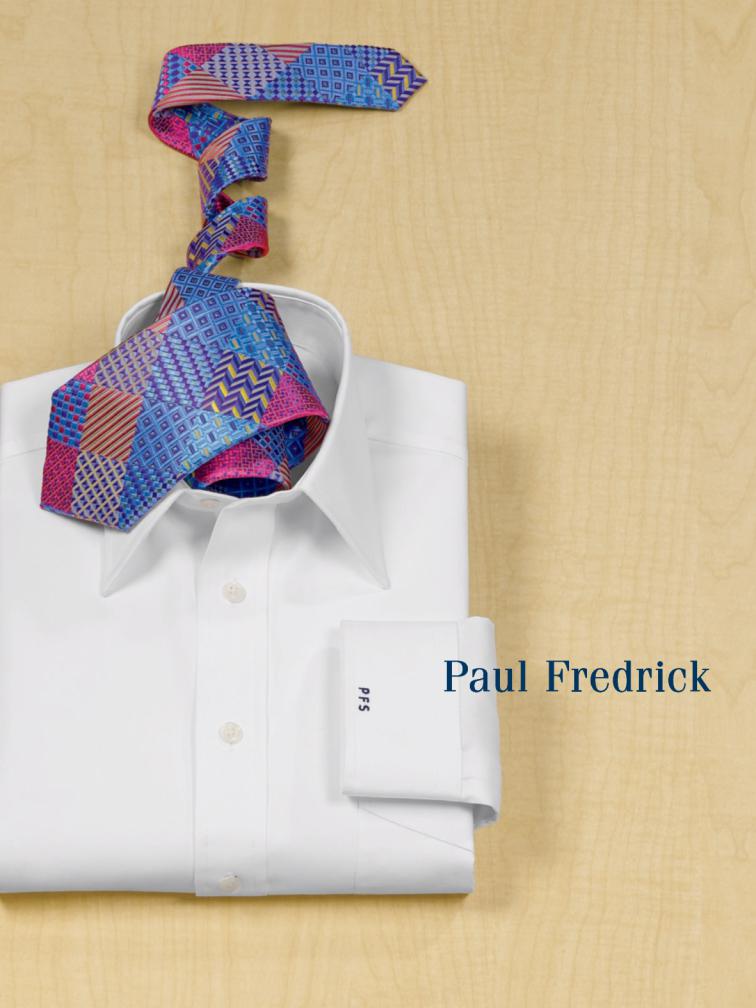
:7,*0(3
INTRODUCTORY PRICE
YLN
V\Y ILZ[ ZLSSPUN KYLZZ ZOPY[ [OL WPUWVPU[ V_MVYK
^OP[L JV[[VUJVSSHY Z[`SLZI\[[VU VY MYLUJO J\ɈZYLN\SHY IPN [HSS VY [YPTÀ2¹ _ ¹ [V ¹ _ ¹
-9,, TVUVNYHTTPUN
YLN
(KK [OPZ ZPSR [PL MVY Q\Z[
YLN
WH\SMYLKYPJR JVT [Y`
:WLJPM` WYVTV[PVUHS JVKL TWRSTX
FREE EXCHANGES. 5L^ J\Z[VTLY VɈLY 3PTP[ ZOPY[Z WLY J\Z[VTLY :OPWWPUN JOHYNLZ L_[YH
*HUUV[ IL JVTIPULK ^P[O V[OLY VɈLYZ ,_WPYLZ
WorldMags.net
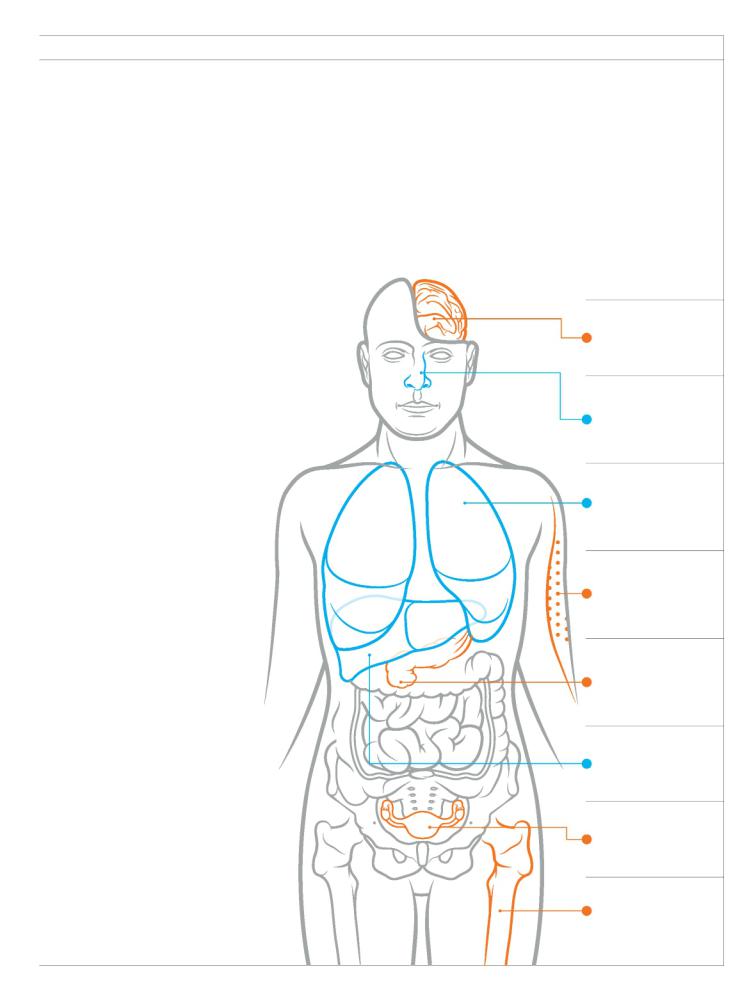
Briefing
Health
Most Cancer Is Out of Our Control Random DNA changes are usually to blame
BY ALICE PARK
we think we know what causes cancer: smoking, the sun’s UV rays, tumor-causing genes we inherit from Mom and Dad. But these factors alone can’t explain why cancer in its many forms is poised to edge out heart disease as America’s No. 1 killer within the next few years. That rise has sparked a spate of research into how much of cancer is within our control and how much of it is simply a roll of the genetic dice.
Now, in an eye-opening study published in Science, researchers report that the majority of cancer types are the result of pure chance, the product of random genetic mutations that occur when stem cells—which keep the body chugging along, replacing older cells as
they die off—make mistakes copying the cells’ DNA.
Cristian Tomasetti and Dr. Bert
Vogelstein at the Sidney Kimmel Comprehensive Cancer Center of Johns Hopkins University School of Medicine found that the more stem cells there are in certain kinds of tissues and the more often they divide, the more likely that tissue is to develop cancer over a person’s lifetime. About 65% of cancers are the result of these DNA mistakes made by stem cells.
Only a small proportion of a tissue’s cells are stem cells, which are essentially templates for making more tissue. The catch is that this kind of DNA copying is also the process behind cancer, which is triggered by cells that pick up mutations in their genes when they divide.
The element of chance does not, however, mean you should stop wearing sunscreen or take up smoking. “My biggest fear is that people will do nothing. The opposite is true,” says Tomasetti, who stresses that while we may not be able to prevent all tumors, we can focus on early detection and taking advantage of lifesaving treatments like chemotherapy and radiation, among other things. “We need to do everything we did before, but we want to do it even more than before.”
LIFESTYLE OR BAD
LUCK? IT DEPENDS
ON THE CANCER
GLIOBLASTOMA
The cells that cause this cancer divide often, making many errors
BASAL-CELL
CARCINOMA
The most common skin cancer is triggered
by exposure to UV rays
LUNG
Smoking, and the carcinogens in tobacco smoke, are the main drivers of lung cancer
MELANOMA
Because skin cells divide so frequently, this cancer is among the deadliest
PANCREATIC
This cancer is strongly affected by random mutations as opposed to lifestyle factors
LIVER
Risk of this cancer increases with age and heavy alcohol use
OVARIAN GERM CELL |
|
|
A hard-to-treat cancer, it’s |
L L I |
|
mostly the result of stem- |
T SU |
|
I AT R |
||
cell DNA-copying errors |
||
|
NO |
|
|
Y B |
|
OSTEOSARCOMA |
D D O T |
|
D |
||
Bone cells are actively |
T E |
|
E L I W |
||
dividing, leading to |
||
many chances for tumor- |
O F R |
|
causing mistakes |
I T R |
|
|
E M |
Source: Science |
WorldMags.net |
time January 19, 2015 |

WorldMags.net

Reach thousands of top decision makers by using one or more of the key Fortune lists: Fortune 500 Fortune 1000
Fortune Global 500
The Fortune Databases give you everything you need:
key financial and company contact information in an easy-to-use spreadsheet...the ability to download, sort and mine the data...a roundup of the largest and most important companies to research, prospect and target.
To find out more, go to · fortunedatastore.com
Copyright 2014 Time Inc. FORTUNE® and the FORTUNE Database names are trademarks of Time Inc. All rights reserved.
WorldMags.net
